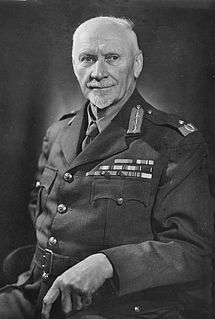A Quote by Francois de La Rochefoucauld
Humility is often only the putting on of a submissiveness by which men hope to bring other people to submit to them; it is a morecalculated sort of pride, which debases itself with a design of being exalted; and though this vice transform itself into a thousand several shapes, yet the disguise is never more effectual nor more capable of deceiving the world than when concealed under a form of humility.
Related Quotes
It is almost impossible to overestimate the value of true humility and its power in the spiritual life. For the beginning of humility is the beginning of blessedness and the consummation of humility is the perfection of all joy. Humility contains in itself the answer to all the great problems of the life of the soul. It is the only key to faith, with which the spiritual life begins: for faith and humility are inseparable. In perfect humility all selfishness disappears and your soul no longer lives for itself or in itself for God: and it is lost and submerged in Him and transformed into Him.
There is one vice of which no man in the world is free; which every one in the world loathes when he sees it in someone else; and of which hardly any people, except Christians, ever imagine that they are guilty themselves. […] There is no fault which makes a man more unpopular, and no fault which we are more unconscious of in ourselves.[…]The vice I am talking of is Pride or Self-Conceit: and the virtue opposite to it, in Christian morals, is called Humility.
Humility, which Burke ranked high among the virtues, is the only effectual restraint upon this congenital vanity; yet our world has nearly forgotten the nature of humility. Submission to the dictates of humility formerly was made palatable to man by the doctrine of grace; that elaborate doctrine has been overwhelmed by modern presumption.
Pride looks back upon its past deeds, and calculating with nicety what it has done, it commits itself to rest; whereas humility looks to that which is before, and discovering how much ground remains to be trodden, it is active and vigilant. Having gained one height, pride looks down with complacency on that which is beneath it; humility looks up to a higher and yet higher elevation. The one keeps us on this earth, which is congenial to its nature; the other directs our eye, and tends to lift us up to heaven.
A novel which survives, which withstands and outlives time, does do something more than merely survive. It does not stand still. It accumulates round itself the understanding of all these persons who bring to it something of their own. It acquires associations, it becomes a form of experience in itself, so that two people who meet can often make friends, find an approach to each other, because of this one great common experience they have had.
It is not merely the brevity by which the haiku isolates a particular group of phenomena from all the rest; nor its suggestiveness, through which it reveals a whole world of experience. It is not only in its remarkable use of the season word, by which it gives us a feeling of a quarter of the year; nor its faint all-pervading humour. Its peculiar quality is its self-effacing, self-annihilative nature, by which it enables us, more than any other form of literature, to grasp the thing-in-itself.
As regards this vice, we read that the peacock is more guilty of it than any other animal. For it is always contemplating the beauty of its tail, which it spreads in the form of a wheel, and by its cries attracts to itself the gaze of the creatures that surround it. And this is the last vice to be conquered.
































